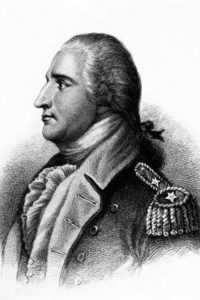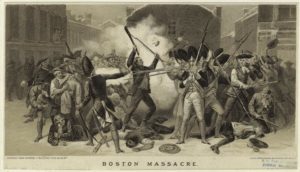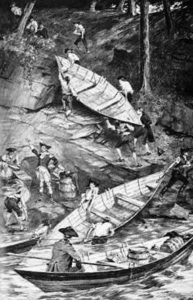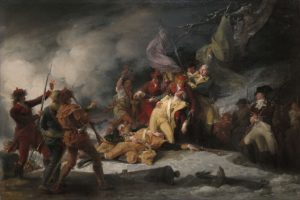Andebit et beaqui corendit, ut quostes esciendion re dit ad et prae parion es quia quas alibus sam, omnim faciden ducipidiat arum autem nobis enis es voat

Benedict Arnold and the Beginning of the Revolution

Born in 1741, to a well-established merchant family in Norwich, Connecticut, Benedict Arnold had a troubled past. He was the second of six children, but only he and his sister survived to adulthood. Some historians believe that the death of Arnold’s siblings contributed to his father’s alcoholism, which resulted in him losing the family business and being placed in debtor’s prison.
No longer able to attend private school and ambitions of attending Yale dashed, the unruly teen acted out. He was prone to feats of danger and spent a great deal of time playing with what remained of the local Indian children. The young man needed a trade to keep him out of trouble. Arnold’s mother eventually found young Benedict an apprenticeship with Dr. Lanthrop, a physician and practicing apothecary, where he was to serve until he was 21.
Arnold appreciated the return to people of gentlemanly refinement, but he could not suppress his rebellious spirit. When warfare was renewed with the France and its allies during the Seven Years War, 14-year-old Arnold attempted to run away to join the British war effort against the French colonies several times. When he was 16, he succeeded in joining a militia company dispatched to relieve Fort William Henry on Lake George, but returned home when he learned his mother was ill. His mother soon died and Arnold continued his apprenticeship with Dr. Lanthrop.
When Arnold completed his term of service in 1762, Dr. Lanthrop gave him a loan to set up his own apothecary in New Haven, Connecticut. The economy was booming as men and material came and went from New England ports to support the troops on the frontier of the New World. Arnold became a successful businessman. He eventually raised enough money to repay Dr. Lanthrop and buy three ships to take part in the lucrative West India trade. Shipping was vital to the economy of the New World and merchants, like Arnold, established a growing middle class that made their fortune by avoiding trade laws and tariffs established by the British Government.
British Taxes
Benedict Arnold’s experience was typical of many merchants. He was successful during the boom years of the French and Indian War, but when the post-war economy declined and the tax collections by the British increased, business waned. Arnold was facing financial ruin, falling £16,000 in debt. He became a vocal opponent of the new taxes. As the number of violent incidents in New England increased, British General Gage dispatched several regiments of troops to occupy Boston.

The presence of the troops was unsettling for the disgruntled civilians. Arnold was in the West Indies when a confrontation between angry citizens and a British sentry escalated into the Boston Massacre.
Letter from Arnold to friend Douglas, Esquire, New Haven:
St. George’s Key, 9th June, 1770
Dear Sir,
I am now in a corner of the world whence you can expect no news of consequence, yet was very much shocked the other day on hearing the accounts of the most wanton, cruel, and inhumane murders committed in Boston by the soldiers. Good God! Are the Americans all asleep; and tamely yielding up their liberties, or are they all turned philosophers, that they do not take immediate vengeance on such miscreants; I am afraid of the latter and that we shall all soon see ourselves as poor and as much oppressed as ever a heathen philosopher was.
With great Esteem, Dear Sir, your sincere Friend,
Arnold
Arnold began the war as a captain in Connecticut’s militia, a position to which he was elected in March 1775, and was among the men dispatched to assist the Rebel uprising against the British in Boston. When he arrived there he proposed to the Massachusetts Committee of Safety a mission to take over Fort Ticonderoga, a strategic outpost known to be poorly defended but vital to protect against and attack from Quebec.
Arnold received a colonel’s commission in the Massachusetts Militia and was ordered to take Ticonderoga, but he did not anticipate running into Ethan Allen and his Green Mountain Boys en route to Ticonderoga. Arnold had the orders and Allen the men so they agreed to go together. Yet they still competed for power:
This is to certify that previous to Colonel Benedict Arnold’s arrival to the Forts Ticonderoga and Crown Point, a Committee sent from the Colony of Connecticut, furnished with money for the purpose of reducing and garrisoning said Forts, had, with the assistance of seventy-five men from Massachusetts, and one hundred and forty from the New Hampshire Grants, marched within a few miles of Ticonderoga, and this morning, at daybreak, took possession of said Fort, and have given the command thereof into the hands of Colonel Ethan Allen. And said Arnold refuses to give up his command, which causes much difficulty.
Allen Mott to the Provincial Congress
Ticonderoga, May 11, 1775
After the capture of Ticonderoga, the Rebels were fighting among themselves. Arnold was disturbed when he found that Allen had taken all credit for the capture of Ticonderoga for himself, but Allen and his Green Mountain Boys departed soon after the alcohol was depleted.
Arnold made significant improvements to the fort during his time on Lake Champlain, often spending his own money to ensure it was prepared in case of attack. He built barracks and additional outworks at Fort Ticonderoga and even led a raid against the British port at St. John, in Quebec, capturing additional boats, but in June a colonel from the Connecticut militia arrived and again rivaled Arnold’s command. The command was given to the younger officer and Arnold resigned his commission from the Massachusetts Militia:
Colonel Arnold’s Refusal to Serve Any Longer
Crown Point, June 24, 1775
“In the first place, I observe you are appointed co examine my conduct, and in what manner I have executed my commission. I look on this instruction at this juncture an unprecedented, and a very plain intimation that the Congress are dubious of my rectitude or abilities, which is a sufficient inducement for me to decline serving them longer…. it appears to me very extraordinary that the Congress should first appoint an officer, and afterwards, when he had executed his commission, to appoint a Committee to examine if he was fit for his post.
The last objection I have to make is that I have so far lost the confidence of the Congress, that they have declined sending me money, as was promised by Captain Brown, to discharge the small and unavoidable debts I have contracted for necessaries for the use of the Army, for which my own credit is at stake, and I am reduced to the necessity of leaving the place with dishonor, or waiting until I can send home and discharge those debts out of my private purse.
All which reasons I believe will be thought a sufficient inducement for me to decline holding my Commission longer.
“I am, Gentlemen, your most humble servant,
Benedict Arnold
Such disputes for command were not uncommon as the colonists established makeshift political structures at the state and national level. Things became slightly more structured when in May 1775, the Second Continental Congress convened in Philadelphia, establishing a temporary Colonial government. On June 14, Congress established the Continental Army, appointing George Washington as commanding general. They quickly dispatched him to New England to take command of the Siege of Boston.
Arnold’s Invasion of Quebec
On June 27, Congress authorized General Philip Schuyler to investigate whether an invasion against the British in Quebec was practical. When Schuyler learned that British General Guy Carleton had approached the Iroquois for help and that he was fortifying St. John, Schuyler selected General Richard Montgomery to launch an Invasion of Canada.

Arnold had written Congress suggesting such an undertaking against Canada when he took control of Fort Ticonderoga. He believed that he should have been selected for the command. Arnold went to Boston and convinced George Washington to send a second force under his command. Washington took notice of the abilities of the young man and the two struck an unlikely friendship. Arnold was given a colonel’s commission in the Continental Army and 1,100 men to lead an attack on Quebec.
It wasn’t until December 31, 1775, that a coordinated attack was launched against the entrenched city. Montgomery died and Arnold took a shot in the leg as their attack was hastily repelled by General Guy Carleton. Arnold was promoted to brigadier general and continued to lay siege on the city until he was relieved of command in April 1776.
To Hannah Arnold
Camp before Quebec, January 6, 1776
My Dear Sister,
Before this reaches you I make no doubt you will have heard of our misfortune of the 31st ultimo and will be anxious for my safety. I should have wrote you before, but a continual hurry of business has prevented me. The command of the Army, by the death of General Montgomery, devolved on me; a task, I find, too heavy under my present circumstance. I received a wound by a ball through the leg, at the time I had gained the first battery at the lower town, which by the loss of blood, rendered me very weak… I have no thoughts of leaving this proud town until I enter it first in triumph. My wound has been exceedingly painful, but is now easy, and the surgeon assures me will be well in eight weeks. I know you will be anxious for me in eight weeks. The Providence, which has carried me through so many dangers, is still in my protection. I am in the way of my duty and know no far.

Arnold was one of America’s greatest heroes at the time. He had succeeded in capturing Fort Ticonderoga and Crown Point, lead a courageous raid against St. John, trekked through the wilderness to Quebec, and was the last man to leave Canada. He then was given orders to construct a Navy at Skenesborough (present-day Whitehall, NY) and led a successful delaying tactic, which saved Fort Ticonderoga from attack in 1776.
He had his enemies too. During the winter of 1776 a handbill was distributed that said “Money is this man’s God, and to get enough of it he would sacrifice his country.” After the Battle of Valcour, Arnold went to New Jersey to assist General Washington, but in November the British seized Newport and Washington assigned Arnold to the defense of Rhode Island.







